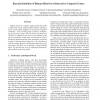Free Online Productivity Tools
i2Speak
i2Symbol
i2OCR
iTex2Img
iWeb2Print
iWeb2Shot
i2Type
iPdf2Split
iPdf2Merge
i2Bopomofo
i2Arabic
i2Style
i2Image
i2PDF
iLatex2Rtf
Sci2ools
139
Voted
ICPR
2006
IEEE
2006
IEEE
Bayesian Imitation of Human Behavior in Interactive Computer Games
Modern interactive computer games provide the ability to objectively record complex human behavior, offering a variety of interesting challenges to the pattern-recognition community. Such recordings often represent a multiplexing of long-term strategy, mid-term tactics and short-term reactions, in addition to the more low-level details of the player's movements. In this paper, we describe our work in the field of imitation learning; more specifically, we present a mature, Bayesian-based approach to the extraction of both the strategic behavior and movement patterns of a human player, and their use in realizing a cloned artificial agent. We then describe a set of experiments demonstrating the effectiveness of our model. 1 Motivation and Related Work Interactive computer games, with their increasingly complex virtual worlds and ability to record the actions of humans within them, present interesting opportunities to the pattern-recognition community [7]. So far, the AI systems empl...
Complex Human Behavior | Computer Vision | Human Reasoning Tasks | ICPR 2006 | Long-term Strategic Behaviors |
Related Content
| Added | 09 Nov 2009 |
| Updated | 09 Nov 2009 |
| Type | Conference |
| Year | 2006 |
| Where | ICPR |
| Authors | Bernard Gorman, Christian Bauckhage, Christian Thurau, Mark Humphrys |
Comments (0)

